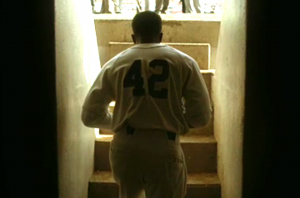 The Jackie Robinson biopic is rated PG-13. The only reason for the 13 part of the PG-13 is the frequent and extensive use of the n-word that refers to African-Americans.
The Jackie Robinson biopic is rated PG-13. The only reason for the 13 part of the PG-13 is the frequent and extensive use of the n-word that refers to African-Americans.
Other than that, it is nice, soft, heroic, and inspiring.
Which is blessing and a curse.
It is a blessing because you can take your kids to see this movie about a great American hero. The whole family can be inspired.
But it is a curse because the great American story of Jackie Robinson deserves a great movie and this isn’t it.
The story of Jackie Robinson isn’t nice. Not nice at all. That’s what makes it great.
Jackie Robinson was signed to the Brooklyn Dodgers in 1947, becoming the first black man to play Major League Baseball. He integrated a sport at the very heart of America’s identity. Along with mother and apple pie, baseball defined what it meant to be American.
Until Jackie Robinson, baseball meant white players in the Major League and African-American players in the Negro League. That was the way things were, the racism forming the everyday life of every American as ubiquitous and generally unquestioned as the air they breathed.
Then, as now, you didn’t go to a baseball game to think about social injustice, poverty, or racism. You went to cheer your team on, to beg for autographs from idolized players, to track the stats and marvel over the crack that sent a ball flying over the fence.
This is exactly why integrating baseball was so important. It functioned at a deeper level than rational thought.
In the film, Dodgers executive Branch Rickey is played by Harrison Ford with guttural country colloquialisms. Partly because of his deep faith and party because, as he says, dollars aren’t black or white, but green, Rickey leads the charge to sign a black player to the Dodgers ranks. The film matter-of-factly portrays his faith and the answering faith of Robinson. Rickey picks Robinson (Chadwick Boseman) as much for his character as for his baseball skill.
The man who integrates baseball must be strong, strong enough to stand up against the rage that will come. He must be courageous. He must be level-headed. Above all, he must play the long game, passing by chances to punish his taunters in physical fights or shouting matches for the ultimate prize of beating them on the field.
With the support of his wife Rachel (Nicole Beharie), Robinson is that man. Turned away from airlines, refused a room at hotels, mocked by other players, jeered by the crowds, Robinson keeps his head down and calmly, deliberately, excellently plays baseball.
That is the beauty of the movie and the story: That one well-placed man, just doing his job, can impact the very soul of a nation.
That is why this is a movie that you can be proud to take your children to, a movie to share and discuss.
And yet, I left the film feeling dissatisfied.
Last year, Steven Spielberg brought another great American story to the big screen. Lincoln, like 42, told the story of a great man in a time that needed him.
I left Lincoln feeling not only that I knew the story, but that I knew the man. And even more that that: The movie contained questions left unanswered, a level of cinematic poetry that touched beyond its story to the core of humanity.
In the fine, very nice movie 42, you leave knowing the story and a bit about the man, but there are still depths to plumb and poetry to bring to life. We need to know more than the story. We need to know what it felt like to be denied access to a bathroom or a seat on a plane. We need to understand the unconscious ugliness of post war race relations.
And as much as I wanted it to, 42 did not reach those heights.
It’s a shame because there are no American stories greater than those of Jackie Robinson and heroes like him. Harriet Tubman, Martin Luther King Jr., just to name a few, are great Americans and their stories deserve to be told every bit as well as Lincoln and his ilk.
It’s been a while since a bloom of great movies about African-Americans, since Roots mesmerized us on TV and Boyz n the Hood on the silver screen, since Malcolm X, Ray, Do the Right Thing, and Glory. We need African-American directors with the skill and passion to make us feel them, make us know, help us understand our shared history.
I liked 42, but I’d like to see it done again, perhaps not PG-13, deeper, more bothersome, richer, more true.












